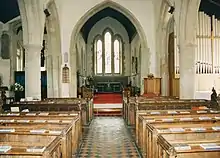| St Mary's Church | |
|---|---|
 St Mary's Church, Haddenham | |
| 51°45′57″N 0°55′36″W / 51.76583°N 0.92667°W | |
| Country | England |
| Denomination | Church of England |
| Previous denomination | Roman Catholic |
| Website | St Mary's, Haddenham |
| Architecture | |
| Heritage designation | Grade I |
| Designated | 21 December 1967 |
| Administration | |
| Province | Canterbury |
| Diocese | Oxford |
| Archdeaconry | Buckingham |
| Deanery | Aylesbury |
| Benefice | Wychert Vale Benefice |
| Parish | Haddenham with Cuddington, Kingsey and Aston Sandford |
| Clergy | |
| Vicar(s) | Revd. Cassa Messervy |
| Curate(s) | Ian Herbert, Trish Mander |
St Mary's Church is the Church of England parish church of Haddenham, Buckinghamshire[1][2][3] It is a Grade I listed building.[4]

History
Parts of the church are 12th century Norman, from when the Benedictine abbey of Rochester, Kent held the parish. The first priest was called just Gilbert.
Other parts of the building may be from the original Saxon church, including the font, which has a drawing of a dragon imprinted on it. The tower is Early English Gothic and according to experts, it is the finest demonstration of Early English in the county.
In 2008 the church had major refurbishments, as part of the Millennium 2 project. A new vestry, creche and kitchen were built and the roof was repaired, along with other additions and fixings.
The astronomer William Rutter Dawes is buried in the churchyard.[5] Episodes of the murder mystery television series Midsomer Murders were filmed on the church grounds.
In the Covid-19 pandemic, the church authorities opted not to reopen St Mary's fully for very much longer than the official guidance recommended, in part because the parish was waiting for a new Rector to arrive. While churches were expected by the Government to be closed from late spring to early summer 2020, St Mary's did not fully re-open until May 2021.[6] As a result, families with young children were unable to attend the church regularly for over a year, meaning they were unable to pass the church attendance test for the local Church of England secondary school. This led to an important ruling by the Office of the Schools Adjudicator about school admissions during the pandemic.[7]
Organ
A pipe organ built by Norman and Beard of Norwich was installed in 1967. The organ had been built in 1916 for a church in London, which was bombed in the Second World War. In 2007 this was replaced because its restoration would cost more than a new instrument so a new electric organ was put in the church as part of the parish's Millennium 2 project.[8]
Organ Specifications
The full organ specifications are as follows:
- Great Organ
- Double Diapason 16
- Open Diapason 8
- Stopped Diapason 8
- Dulciana 8
- Principal 4
- Flute 4
- Twelfth 2 2/3
- Fifteenth
- Blockflute 2
- Sesquialtera II Alterable Voice
- Mixture IV
- Orchestral Trumpet 8 Alterable Voice
- Trumpet 8
- Clarinet 8
- Couplers
- Swell to Great
- Swell to Pedal
- Great to Pedal
- Swell Tremulant
- Great Tremulant
- Gt & Pd Pistons Coupled
- Auto Pedal
- Swell Organ
- Open Diapason 8
- Chimney Flute 8
- Echo Gamba 8
- Voix Celeste 8
- Principal 4
- Rohr Flute 4
- Fifteenth 2
- Larigot 1 1/3 Alterable Voice
- Mixture III
- Scharf III Alterable Voice
- Contra Fagotto 16
- Cornopean 8
- Oboe 8
- Clarion 4
- Pistons
- 8 Pistons to Great
- 8 Pistons to Swell
- 8 General Pistons
- 3 Reversers
- Set & Cancel Pistons
- 8 toe pistons duplicating generals
- Stop sequencer system with 16 pages and 8 steps per page
- Sequencer Advance thumb piston in Swell key slip
- Audio
- 6 Audio channels
- Full range speakers South wall
- Pedal Organ
- Contra Bourdon 32 Alterable Voice
- Open Diapason 16
- Subbass 16
- Bourdon 16
- Octave 8
- Gedackt 8
- Choral Bass 4
- Flute 4
- Trombone 16
- Trumpet 8 Alterable Voice
- Features
- Two Expression Pedals
- Alternative Voicing Programme
- 64-Stop Library
- Alesis reverberation unit (characteristics selectable via keyboard commands)
- Wind noise and wind robbing effects
- Full MIDI interface
- Multi LED display showing capture system status, library stop selection and sequencer function
- 12 different tuning Temperaments
- Theatre Tremulant switch
- Headphone socket
- Transposer and fine tuning control
- Two additional alterable-voice specifications controlled by pistons (German and French)
- Five different tunings for celeste
- 14 speed and 8 depth variations for tremulants
- Organ Console finished in dark oak"

References
- ↑ Archbishops' Council. "Haddenham: St Mary the Virgin, Haddenham". A Church Near You. Church of England.
- ↑ "St. Mary's, Haddenham". 2010.
- ↑ "New Welcome - St Mary's Haddenham". www.haddenhamstmarys.org. Retrieved 3 October 2022.
- ↑ Historic England. "Parish Church of St Mary (Grade I) (1118285)". National Heritage List for England. Retrieved 24 October 2015.
- ↑ "St Mary's Haddenham". Retrieved 1 May 2020.
- ↑ https://lordslibrary.parliament.uk/covid-19-reopening-church-buildings-and-the-financial-impact-of-closure/
- ↑ "Waddesdon Church of England School: 21 February 2023". GOV.UK. Retrieved 24 August 2023.
- ↑ Eminent Organs Cathedral Organs. "Eminent from Cathedral Organs – Fine real-time digital computer organs – Musical Artistry". cathedralorgans.com.
Further reading
- Page, W.H., ed. (1908). A History of the County of Buckingham. Victoria County History. Vol. 2. London: Archibald Constable & Co. pp. 281–286.
- Pevsner, Nikolaus (1960). Buckinghamshire. The Buildings of England. Harmondsworth: Penguin Books. pp. 149–150. ISBN 0-14-071019-1.
- RCHME, ed. (1912). An Inventory of the Historical Monuments in the County of Buckinghamshire. Vol. 1, South. London: Her Majesty's Stationery Office. pp. 176–184.